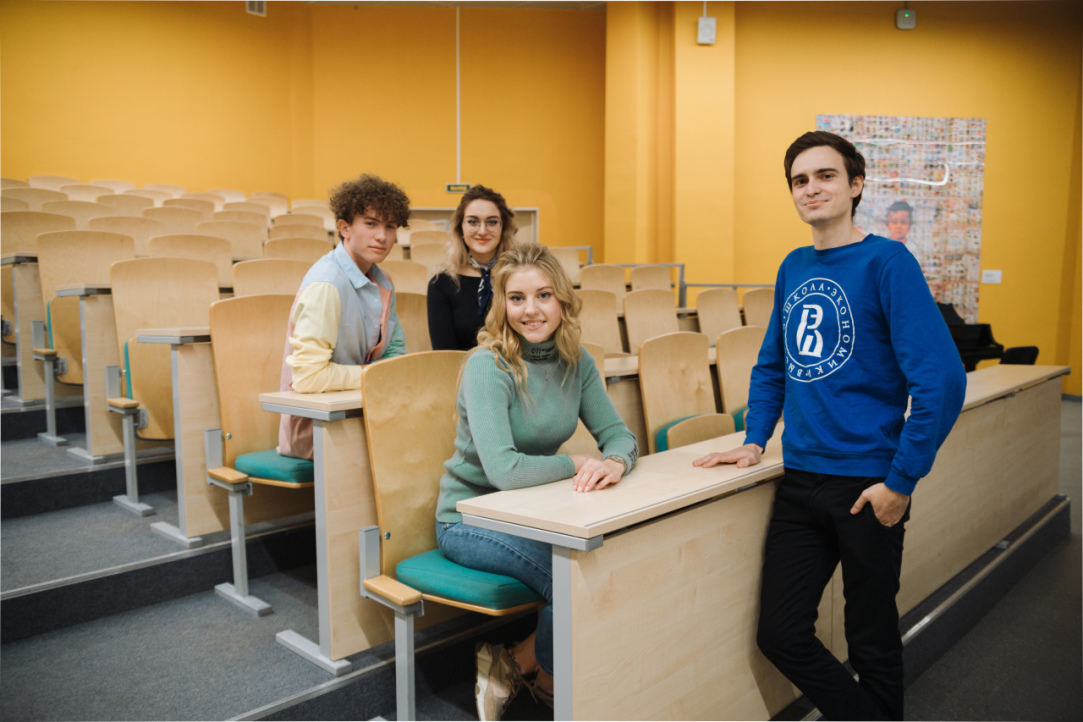How to Choose Which Second Foreign Language to Learn
Students of the Political Science and World Politics programme study a second foreign language at the university. Current options include Chinese, German, Portuguese, and French, with Spanish set to be added next academic year. In this article, the programme's teachers and the leaders HSE University-St Petersburg language clubs discuss why knowing a foreign language can come in handy and how to make the right choice.

Lyudmila Veselova, Academic Supervisor of the Master's in Business and Politics in Modern Asia, Academic Supervisor of the Chinese Club at HSE University-St Petersburg

The Chinese language is becoming more and more popular. We can see that it is in high demand in almost all spheres of life, including business and politics. Chinese cannot be studied in isolation from the history and culture of China, so those who study Chinese should at least have a general understanding of the country's cultural characteristics. Over the next five to ten years, demand for specialists in the Chinese language and culture will only grow—including in St Petersburg, where there are many projects implemented together with Chinese companies and corporations.
I have been studying Chinese for 18 years and I still can't say that I am a fluent speaker. What attracts me to the Chinese language is its close relation to the history and culture of China. When practising writing a certain character, we find out that there is always a separate long story being it—there is nothing like it in any European language. Learning Chinese is like solving puzzles; it is a very logical language. Once you understand its logic and how the grammar rules work, it is no longer that complicated. Learning Chinese makes us realise how brilliant the people who invented it were; this language is beautiful in its logic, boasting a rich historical and cultural background. I would say the most important thing is to be genuinely interested in China, since knowing the culture and history of the country plays a crucial role in the learning process.
The Chinese Club has been running at HSE University for quite a long time. Three years ago, we decided to introduce some changes. Now there are two separate directions: the first is a conversation club where students who are interested in learning Chinese meet and communicate on various topics, while the second is devoted to meetings with invited speakers. The topics are very broad, and we involve experts from different fields so that everyone can find something they are interested in. The events are held in Russian, so speaking Chinese is not obligatory.
In China, there is a saying: '活到老,学到老', which can be translated as 'You are never too old to learn'. In my opinion, the Chinese are pioneers when it comes to lifelong learning, since they have long understood that it is necessary to constantly learn something new and improve your skills. In China, even the elderly prefer to keep themselves busy by studying foreign languages, dancing, practising singing Peking Opera, etc. I think this is a great trend that should definitely be adopted by other countries as well.
Ella Garkun, Lecturer at the Department of Foreign Languages

I think that the German language is popular in Russia because our countries have historically been closely connected. Moreover, political scientists need to have a solid understanding of a country's structure regardless of the current state of relations. And the best way to understand another country is to learn its language.
For me, German is a beautiful language. It is the language of science, culture, and philosophy. Despite the fact that it belongs to the Germanic group of languages, it is very different from English. It has its own energy that reflects my personality. It is also a very precise language that allows you to express any idea succinctly and clearly. Everyone knows that there are a lot of long words in German, but in fact, these consist of shorter words, each of which has its own meaning. These small words merge into an amazing unity, making it interesting to guess the meaning of the whole word.
Is it difficult to learn German? Well, if you make an effort, then no. Of course, it may seem more complicated than English, since there are a lot of declensions and conjugations. But those who study always learn. For my students, the main 'life hack' is to do your homework. But in general, it is more a matter of attitude. When you are passionate about learning a foreign language, then everything is easy. This applies not only to German, but to any activity in our lives.
While learning German, we regularly come across curious proverbs, sayings, and phrases. For example, there is an apt expression: 'lebenslanges Lernen' which means 'learning through life'. The concept of lifelong learning is very important for all of us—students and teachers alike. And personally, I love the proverb 'Alte Liebe rostet nicht', literally translated as 'Old love does not rust' or, if we talk about its Russian counterpart, it will sound like 'старый друг лучше новых двух' (in English 'an old friend is better than two new ones').
Olga Smirnova, Lecturer at the Department of Foreign Languages

Portuguese is the seventh most widely spoken language in the world. It is spoken on three continents and four regions, including not only Portugal and Brazil, but also some African countries (Angola, Mozambique, Cape Verde). The Portuguese language has been actively studied in Macau, Goa, and East Timor. For future political scientists who are interested not only in Europe but also in other regions, it opens up new horizons and gives access to unique sources of information.
Portuguese allows researchers to learn new things and expand their educational geography. Many universities in Brazil have long been recognised throughout the world and have become leading research centres in the fields of social science, the humanities, and natural sciences. In addition, Brazil is the largest developing country in South America in terms of its economy, where, like in Portugal, more and more international companies have begun to establish headquarters in recent years. Besides, we should not forget about the huge potential of Portuguese-speaking countries in Africa.
Personally, I really like how this language sounds. There are a lot of hissing and nasal sounds in European Portuguese that have a magnetic effect on me. When I began studying this language at the university, I discovered a lot of exciting things related to the culture of Lusophones—native speakers of Portuguese. What is more, these people are known for their amazing kindness, humanity and are very pleasant in communication. So knowing Portuguese, among other things, will gift you with loyal friends for life.
Although Russian and Portuguese belong to different language groups, they have pretty similar phonetics. The good news is that Russian speakers deal with common pronunciation challenges more easily than speakers of many other languages. Our students learn European Portuguese. It is more complicated in terms of phonetics and grammar, but once you begin to understand it and speak it, you will be easily understood by native speakers of both the European and Brazilian variants of the language, the latter of which is easier to comprehend.
My main advice to students is to listen to the people speaking the language as much as possible and try to comprehend each word. Portuguese is a Romance language, and the meaning of some words can be easily guessed by knowing English, Russian, or other European languages. You can start, for example, by listening to music that easily and gently immerses you in the world of this magical language. In fact, musical culture is an area in which Portuguese-speaking countries have thrived and continue to stand out, which is not surprising, knowing the amazing musicality of the language itself. One can also begin to get acquainted with the country by reading texts in Portuguese, both in the original version and translated into other languages, as well as discover original literature such as José Saramago, who won the Nobel Prize in Literature.
The expression 'Quem não arrisca não petisca' is similar to the saying 'no risk, no reward'. There is something in this phrase that brings us back to the question of 'why learn Portuguese?'. Perhaps at first glance it is not as popular as some other languages, and it may not be clear where to apply it, but I can say with certainty that Portuguese is worth taking the risk on, because it will be rewarded with new discoveries, friends and unexpected career prospects.
Vera Ageeva, Associate Professor of the Department of Political Science and International Relations, Head of the French Club at HSE University-St Petersburg

French is one of the most widely used languages in world politics. It is often the second official language of international organisations, and it is spoken by hundreds of millions of people on different continents. For any specialist in international relations, knowing French is a big advantage when applying for a job.
I started learning French in high school when I realised that knowing French will help me reach a new professional level. For example, I carried out projects not only in English, but also in French, which allowed me to cover a wider geographic area and have access to other countries. In addition, acquaintance with the French language gives students a chance to join global culture and get a better understanding of Russian culture.
I believe that all languages should be taught in the form of courses: this helps to organise one's time and stay focused. Students need a teacher who will explain the material and answer questions. Of course, self-study is required as well—without it, the learning process can last for years or even decades. My life hack is to find a project related to the language studied, which will force you to practice it right away. I had experience working in various volunteer projects where a knowledge of French was required, such as in an international scouting organisation. There is no need to be afraid that you do not know how to do something yet. On the contrary, it will be a great starting point!
The French Club is not a language club. This is a discussion club in which we discuss world politics, international relations, history, culture, law and other topics in French. Meetings of the club not only broaden our students' horizons, but also provide additional motivation to improve their knowledge of French.
'l'art de vivre' is a French philosophy of life. One should constantly improve oneself and strive for professional fulfilment, but at the same time not forget to live life, see its beauty in daily manifestations. To work effectively, people need to get enough rest. This is what helps nurture talent.
Magdalena Alejandra Gaete Sepulveda, Senior Research Fellow at the Laboratory for Reputation Management in Education, Head of the Spanish Club at HSE University-St Petersburg

Spanish is spoken by more than 500 million people in the world. It is the third most common language after Chinese and English. I have noticed that over the past 15 years, language schools that include Spanish have been growing in Russia really fast, like mushrooms in a forest after a rainy day, because people want not only to speak the language of warm tourist countries, but also to read Latin American literature. And they also want to know first-hand what is happening in Latin America.
Spanish is my native language. I think that knowing Spanish broadens horizons, no matter what country you are from. Yes, it may be a difficult language to learn because it has a rich history and a lot of regional versions, but I have seen first-hand how easily Russians speak Spanish. If working with cases is the main challenge for foreigners learning Russian, the Spanish equivalent would be verbs, thousands of conjugations of each verb that you need to know by heart.
The Spanish Club is a place for communication, where we discuss the topics that students find most interesting. I plan to resume our meetings and start inviting people from the business sphere, as well as other native speakers who live in St Petersburg.
'Un amigo fiel tiene más valor que todo el oro del mundo' means 'A true friend is more precious than all the gold in the world'.

